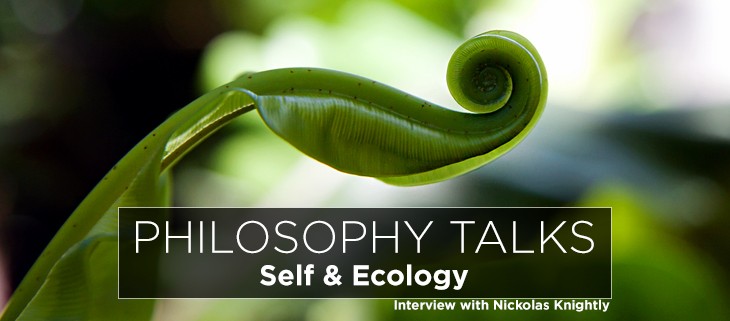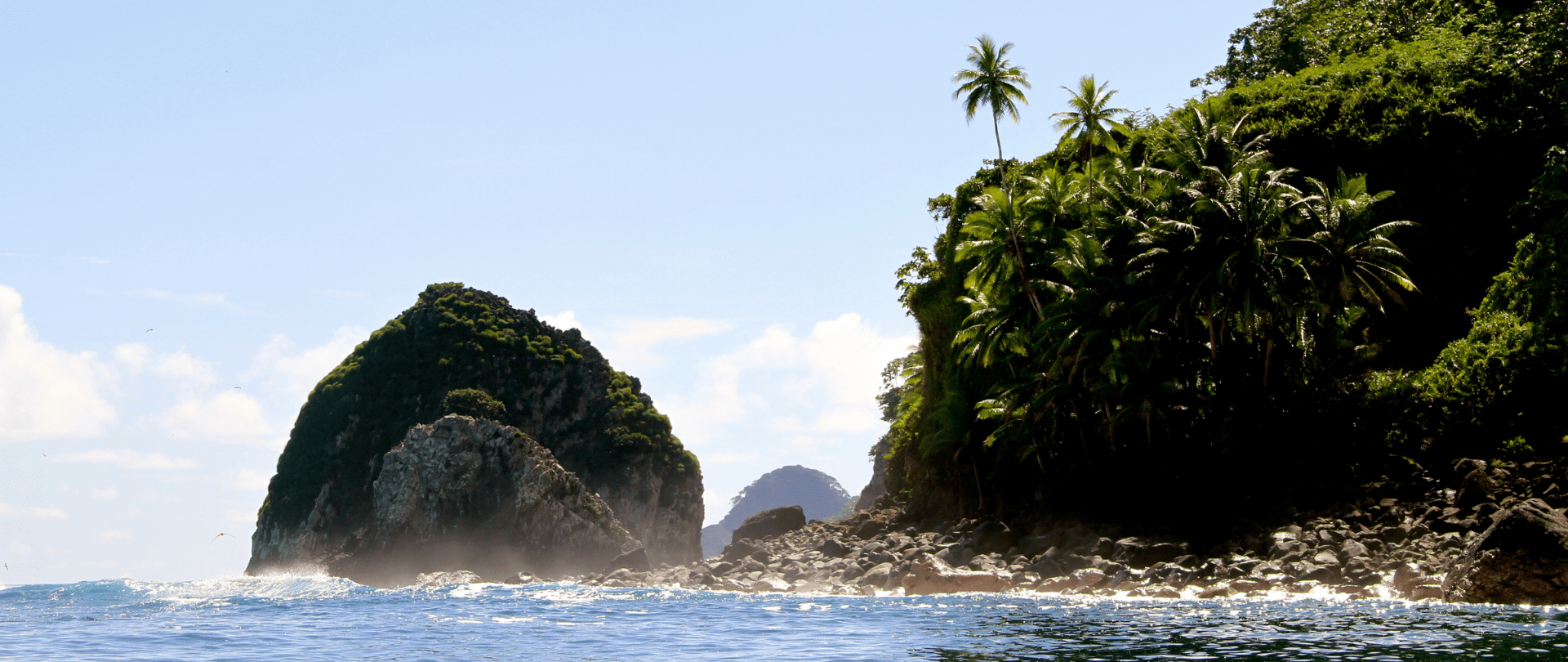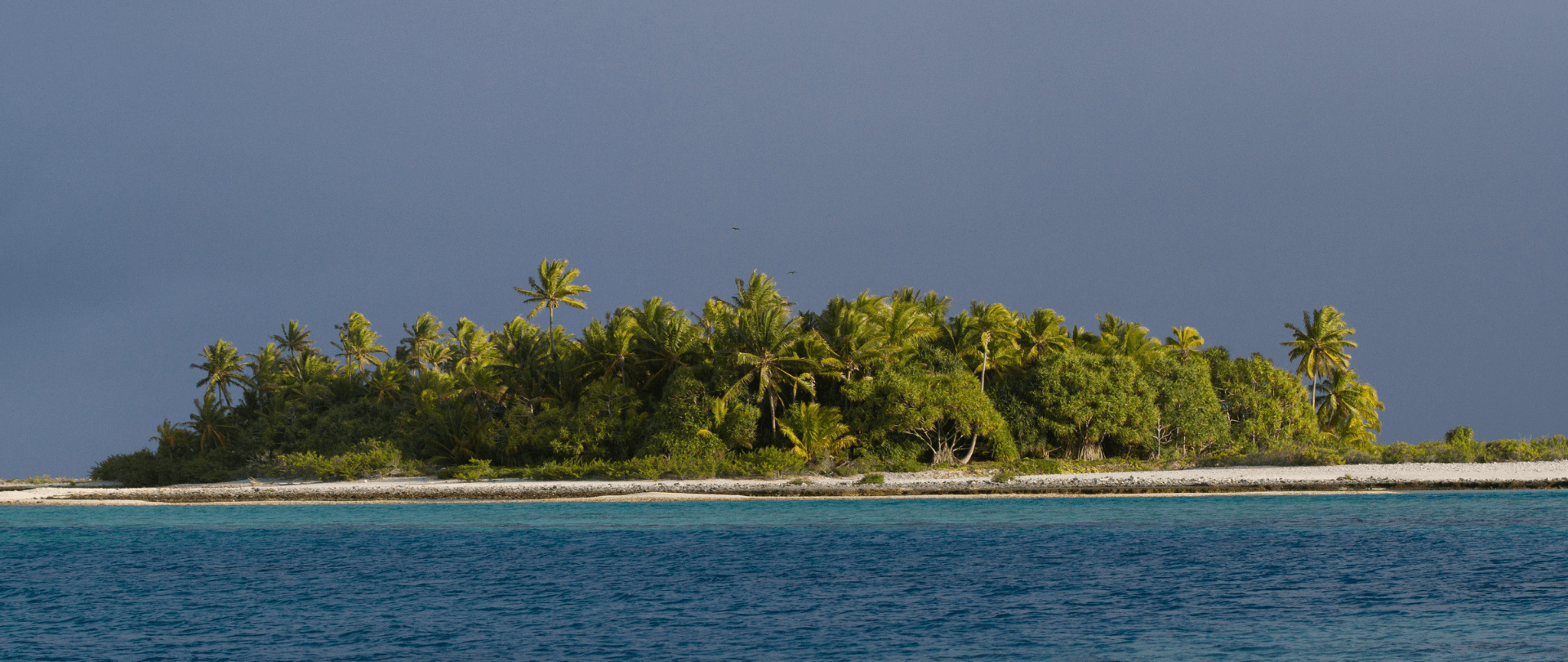The Ebiil Society: Champions of Palau
Ann Singeo, founder of our partner organization the Ebiil Society, shares her vision for a thriving Palau and a flourishing world of indigenous science!
Our 2024 Impact Report is live!
Published on
January 8, 2018
Written by
Sara
Photo credit
Sara

Does philosophy have a place in conservation? Philosophical inquiry can provide pathways to broader and clearer understandings of the daily efforts and deeper purposes of any pursuit, including conservation. The process of asking questions often gives rise to insight and new awareness even if the initial questions remain unanswered.
Sara Kaiser, editor and writer for Island Conservation, recently audited a class titled Philosophy of Mind at the University of California, Santa Cruz. With this blog series, Sara hopes to highlight the questions and unknowns that pervade conservation work, demonstrate the value of inquiry, and stimulate productive dialogue and action throughout the conservation sphere–all in support of the flourishing of life on Earth. This blog series is not intended to make a claim or endorse a particular ethical stance or opinion by Island Conservation.
Nickolas Knightly is a philosopher at the University of California, Santa Cruz. He is currently finishing his doctoral dissertation on philosophy as a way of life. His work arises at the intersection of ecology, art, and spirituality.
Sara: What does the perception of the self have to do with reorienting the mind such that we can care for the conditions of life?
Nickolas: Well we would have to perceive the self, but we haven’t done so. We haven’t really seen ourselves. The issue is to actually look for the self and see what we find.
But, without knowing who we are, deeply, we still take action in the world. This means we base our actions on certain assumptions about what we are, certain ideas, concepts, and habits we inherit from our culture and from our own neuroses. We cling to these habits and concepts, and they come with a lot of negative side-effects.
Some of these habits and ideas are of course quite horrible, and they may function in an unconscious way. For instance, ideas like “I’m not good enough,” “I don’t have enough,” “Human beings are basically selfish and competitive,” and other ideas like these can create all manner of suffering, and we are not aware of all the ideas and habits that are affecting us, and not aware of all the effects that some of these ideas and habits have on us and our world.
These sorts of assumptions about what we are and what other beings are are not things that we perceive when we look or sense with a more authentic vision or a more clarified consciousness. They are certainly not fixed facts about the world and about human nature. We may claim to see evidence for some of these ideas. For instance, we may claim that human beings are self-interested and aggressive, and we may say that we see evidence for this belief, because people are fighting all the time. But in fact, we only see that people are fighting, and we don’t actually see their essential nature. We can’t say that the essence of human beings is self-interest and aggression.
In any case, the question is still, Who am I? This is the basic question of philosophy, and it goes along with, How shall I live? We may actually begin to look for the self. What shape is your self? What color? What size is your self? We have to begin to look. The looking itself is transformative, because ordinarily we observe without any awareness of how we observe, or why—in the deepest sense of why. We take action all the time without a clear awareness of how we take action, and why. This is a subtle point in some ways. Our habits and our assumptions and our whole pattern of thought, speech, and action create negative side-effects, and when we encounter the side-effects we naturally want to resolve them. But we treat the side-effects as if they were unconnected from our own pattern of thinking.
Who am I? This is the basic question of philosophy, and it goes along with, How shall I live?
Consider the example of milling wheat. If wheat is milled on a small scale, and the grain keeps its integrity and nutrients, then you can eat a reasonable amount of bread, along with other kinds of food, and you can maintain your well-being. But in the early part of the 20th century, industrial techniques were developed to scale up production. The resulting wheat was found to lack the nutritional quality of the small-scale wheat. This could have been a signal that the pattern of thinking with respect to producing bread and other foodstuff had gone into error. The proper response would be to change the pattern of thinking. But instead, human beings decided to add synthetic vitamins to the bread. It is certainly possible that, for at least some human beings, wheat intolerance in their system is connected to the perpetuation of incoherent patterns of thinking like this. Aldo Leopold’s insight into thinking like a mountain is also like this. When something stops us and indicates that our relationship to life has become incoherent, we need to reflect on our whole pattern of thinking, and not simply seek a solution from within the pattern of thought, speech, and action that gave rise to the negative side-effects we see.
There are countless examples of this, and I’m sure you and your colleagues at Island Conservation encounter it again and again, in ever-changing guises. I won’t comment on issues you are facing, but in general it seems we have an incoherent, ecologically illiterate relationship with ourselves, with each other, and with the natural world. I was looking at a study recently that spoke about how, “Humans are increasingly attempting to manage the planet’s wildlife and habitats with new tools that are often not fully understood.” In this study, they were looking at human intervention into the fertility cycles of wild horses. They noted that, “When humans perturb this process by intervening in reproductive cycles, the ecological consequences may be profound.” The point, it seems, in large part has to do with reorganizing our relationship with ourselves, each other, and all these beings and ecologies we live with, in, and through. This requires an interruption in the pattern that holds together all our suffering and destruction.
Sara: And this is all the more problematic given that we have technologies to amplify our actions.
Nickolas: Yes. And the thing about technology is how, interesting our relationship is to it. On the one hand we have gotten ourselves involved in these techno-fantasies, which have been around for quite some time. People think that they’re new. Students at university still regularly propose one version or another of a techno-vision in which technology will solve all our problems. This is an idea that is decades old, and even in some deeper sense centuries old. And of course our biggest problems are simply not technological in any way. It’s kind of like that old cartoon called the Jetsons, where the people don’t even live on the ground any longer. They are ungrounded, and they have robots to do things for them, and everything is mechanized and high-tech.
Our biggest problems are simply not technological in any way.
Sara: (laughing) I’ve never heard of the Jetsons but I’ll take your word for it.
Nickolas: The point is that these visions of what we can do with technology have been around for a long time. On the one hand, we hope for a kind of salvation, because we don’t want to let go of this trajectory we’re on. If we look historically, we can see a deep interwovenness of technology, colonialism, war, economic and political ideas, and a certain kind of conceptual abstraction, a certain way of thinking. Sadly, science is interwoven with all of this too.
And then you have the ways in which the developments of technology and the developments of science are sort of confirming and even maybe trying to signal us about deeper awarenesses—that we have access to a deeper wisdom. So if you consider what it would mean to be truly at home in the world, it would mean to have this sense of interwovenness—to really live it. In some very old philosophies and cultures, this is the basic view that they present you: Everything is interwoven, and you need to become attuned to that. We seem to have completely ignored that for quite a long time, but then—low and behold—we have this “connected” world of technology, in which you can’t go anywhere without someone on the other side of the planet being able to access you and in fact being affected by you. That’s a tremendous interwovenness and it’s almost as if—because we stopped accepting and working with the real interwovenness that was already there and is much more sophisticated—then we had to send ourselves a message that we really are connected after all. It is like the soul trying to speak through technology, since that’s what we pay attention to right now.
In some very old philosophies and cultures, this is the basic view that they present you: Everything is interwoven.
We typically have a view that we don’t affect the world, at least not much. We sort of think we can do whatever we want, or we may think that we are so lowly that our lives don’t matter. But this is not so. The great physicist John Wheeler saw that our own best science indicates that we live in a participatory cosmos, not a mechanistic universe in which we don’t matter. Therefore, as we take action without seeing the deep relationality of life, without seeing that we live in a participatory cosmos, we end up building on top of that genuinely magical world a much more superficial kind of connectedness. Certainly it’s complicated, but it’s not more complex than life. It lacks the subtlety and sophistication of ecological and biological relationality. The internet, and all this other interconnectivity—that’s not more complex than life, not more nuanced and miraculous. But this technological connectedness is very complicated and it does have a measure of sophistication. And what does it do? It tells you, “Look! You are connected to everything!” Again, it’s the soul sending itself a message in a bottle. But we’re not reading it. Instead, we’re just holding the bottle and saying “This is amazing! We made this cool bottle! Look how clever we are!” We look at our phone and say, “This is amazing!” Then we get addicted to the phone, and pulled further into the patterns of thinking that produce toxicity, extinction, and so on, and therefore we don’t realize that the phone as a message is saying, “You’re connected to everything! Why won’t you see that!?”
We can then say that we have, in some sense, proven interconnection, proven it to our rational, linear selves in a way we can’t ignore, even in our post-modern, materialistic mindset. We proved it with what is, in a certain light, a rather brutish sort of technology. While it does have a certain sophistication, it can’t hold a candle to the wondrous sophistication of Life itself, or the Divine, or whatever you want to call the whole Mystery we live in. The sophistication of that is so marvelous that we don’t even know if we can yet model it. The chaos and complexity theorists are trying. The cybernetics theorists are trying. Everyone working in nonlinear dynamics and systems theory is trying to touch this grand sophistication of life, and it is not clear how well we will be able to do it. What is clear is that we need new paradigms, and we need a renewal and reinvigoration of older paradigms that already rooted themselves in the sophisticated interwovenness of life.
Systems science in the west only arose with vigor in the past century. This is the most important thing that’s happened in quite a long time. It might be one of the most important things that ever happened to us was to really discover systems science—I mean that in the western sense, and I mean the discovery as it unfolded in the western cultures. Systems science in general has been around for a long time, and we can see this in traditional ways of knowing or Indigenous science. Furthermore, systems insight has arisen in a wide variety of philosophies and cultures, and has always proven deeply transformative in principle. But in this narrow western sense of science, this has arisen as a very new insight. That’s troubling, because what these sciences study is in fact what shapes everything. It’s shaping how we employ technology, how we develop technology, and we still don’t really understand it yet, so it’s a funny thing. Gregory Bateson shares something of this view with me. In Steps to an Ecology of Mind he wrote that, systems science, cybernetics in particular, is “the biggest bite out of the fruit of the Tree of Knowledge that mankind has taken in the last 2000 years.” It’s a big deal. And I think he admired certain religious and wisdom traditions, and many Indigenous cultures too, because they were very clearly sensitive to these systems dynamics, and they work with them in highly effective ways, ways that we cannot duplicate with ordinary reasoning and consciousness as we know it in the west. This is a major factor in the collapse of the conditions of life and other negative side-effects of our dominant patterns of thinking.
Sara: And in the case of ecosystems, which we can understand to be operating on a set of connections that have reached balances over millions of years, how do we proceed to take conservation action when we can’t fully understand what constitutes that connectivity?
Nickolas: Yes. Right. And this is again where Socrates is pleading with us, “Please stop what you’re doing!” But you see the problem we face is that the ones who are leading the destruction are not stopping. They are often doubling down. In ancient Athens, these were just the sort of people Socrates often tried to speak with. Keep in mind that he wasn’t going around telling people what to do. At the same time, he could see that his society was on a path that would result in its downfall. We have seen a lot of studies on this now, studies on the fall of empires. They get caught in patterns of thinking that do not function.
But a fundamental thing Socrates tried to do was to get people to stop, to pause, to interrupt the patterns of insanity and incoherence in their thought, speech, and action. That is what we need today as well, and the problem is that this pausing, this stopping is quite radical. And the reason we need this stopping is that we ourselves can’t, out of the confines of narrow human purposes, decide what to do. We cannot arrive at a wise and just society, with skillful and realistic relationships with each other and the natural world, if we set out using the patterns of thinking that got us into this mess. We have to come to a place of really giving up our opinions and fixed notions. This involves the most basic notions of who we are and what the world is. In other words, self-discovery and self-creation are key. So the question we began with is the question we must go into in order to navigate the crises we face: Who am I, really, and what is this world, really, and how shall I live in it?
Philosophy Talks Series:
Philosophy Talks: Context and Values in Conservation
Philosophy Talks: Mind and Nature
Philosophy Talks: Self and Ecology
Featured photo: Plant life on Palmyra Atoll, Line Islands. Credit: Island Conservation
Check out other journal entries we think you might be interested in.

Ann Singeo, founder of our partner organization the Ebiil Society, shares her vision for a thriving Palau and a flourishing world of indigenous science!

This historic agreement aims to protect the marine and coastal areas of the Southeast Pacific.

Our projects to restore key islets in Nukufetau Atoll forecast climate resilience and community benefits in Tuvalu!

Island Conservation attended the 16th meeting of the Conference of the Parties to the Convention on Biological Diversity!

Island Conservation and partners have published a new paper quantifying ecosystem resilience on restored islands!

Climate Week NYC: what is it and why is it important? Read on to find out why Island Conservation is attending this amazing event!

With sea levels on the rise, how are the coastlines of islands transforming? Read on to find out how dynamic islands really are!

Join us in celebrating the most amazing sights from around the world by checking out these fantastic conservation photos!

Rare will support the effort to restore island-ocean ecosystems by engaging the Coastal 500 network of local leaders in safeguarding biodiversity (Arlington, VA, USA) Today, international conservation organization Rare announced it has joined the Island-Ocean Connection Challenge (IOCC), a global effort to…

Island Conservation accepts cryptocurrency donations. Make an impact using your digital wallet today!